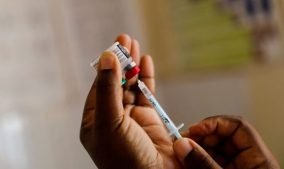Golf South Africa is launching a COVID-19 relief fund that will be focusing on alleviating the plight of the caddies and other supporting staff.
It has set aside R1 million to help vulnerable personnel that are in immediate need of the funds.
So far there’s about R5 million that has been raised by golf clubs around the country to help the underprivileged.
CEO of Golf SA Grant Hepburn says the money will help the vulnerable in this crisis.
‘This is from the money that we have essentially saved through cancellations over the last few weeks and the months ahead but also through voluntary staff salary reductions. We will first be focusing on trying to help those caddies and vulnerable workers that have not seen help because their clubs are slightly smaller or don’t have relief programmes. We feel that as a governing body we would like to put that money upfront and start this fund and hopefully add to that fund to support golfers.”
Hepburn says the money will help about 400 golf clubs in the country.
“Golf as an industry provides thousands of jobs. Just in the golf industry alone, with golf facilities, I’m talking about golf clubs, practice facilities over 40 000 people in those places are employed and one needs to consider the fact that probably 80% – 90% of those people employed in that environment are casual workers, people that are vulnerable members of society. The majority of people in the industry are from that demographic of people that need help. They don’t have savings and they don’t have anything to fall back on.
Golf unions and provincial golf unions will be used as a vehicle to disburse the funds.
SAFA senior managers take voluntary salary cuts:
The South African Football Association’s (SAFA) senior managers have volunteered to take a 15% pay cut in a bid to soften the financial impact of the COVID-19 pandemic. The managers have also recommended several other drastic measures to negate the impact of coronavirus on the association’s finances.
The SAFA managers took the decision at a meeting aimed at considering various cost reduction options. This after they recognised that the postponement of various competitions and activities due to the outbreak of the pandemic has put SAFA’s finances under pressure.
Among the drastic measures recommended is that employees work from home and those who cannot work from home take annual leave from 4 May. If their annual leave doesn’t cover the lockdown, unpaid leave will be taken when their leave is depleted.
No salary cuts for Chelsea players
Meanwhile, Chelsea’s first-team players are not taking pay cuts or contributing towards the club financially due to the COVID-19 pandemic.
The club says following extensive talks, players have instead been asked to continue supporting other charitable causes.
It had been reported that Chelsea were in talks with players over the possibility of a 10% pay cut due to the crisis.
Premier League clubs such as Southampton and West Ham United announced wage deferrals for players. This because of the suspension of English soccer in March due to the outbreak.
Arsenal announced a 12.5% pay cut for players and coaching staff.
Meanwhile, Arsenal has said it will reopen their London Colney training ground to their players next week for individual training. The Premier League club will continue to observe social distancing rules amid the coronavirus outbreak.
Hope to resume playing
Many European leagues are hoping to start up again in the next two or three months, without spectators, and training has begun in Germany and Austria, yet restarting remains fraught with difficulties.
Several leagues around the world have produced a medical protocol for training, mostly along similar lines. These generally involve a thorough testing of players to ensure they are not infected and dividing the squads into groups of six, observing social distancing guidelines.
Yet many details for the restart of competitions, such as whether teams would have to be isolated until the league is finished and what happens if a player tests positive, remain unclear.
Assistant Professor at the Johns Hopkins University School of Medicine Geoff Dreher says it is a difficult situation. “It’s difficult to say right now. Everything is rapidly changing from a day-to-day, week-to-week basis and hopefully, it will be variable depending on the league and the country that you are playing or with the surrounding communities and taking the expertise from the public health officials if they feel like transmission is controlled right now,” says Dreher.
Germany’s Bundesliga may well be the guinea pig as it is the closest of the major leagues that are planning to resume games. Like other leagues, it can only start with a green light from the government. On Thursday, the Bundesliga said players will be monitored by an appointed team health official and would have regular testing.






